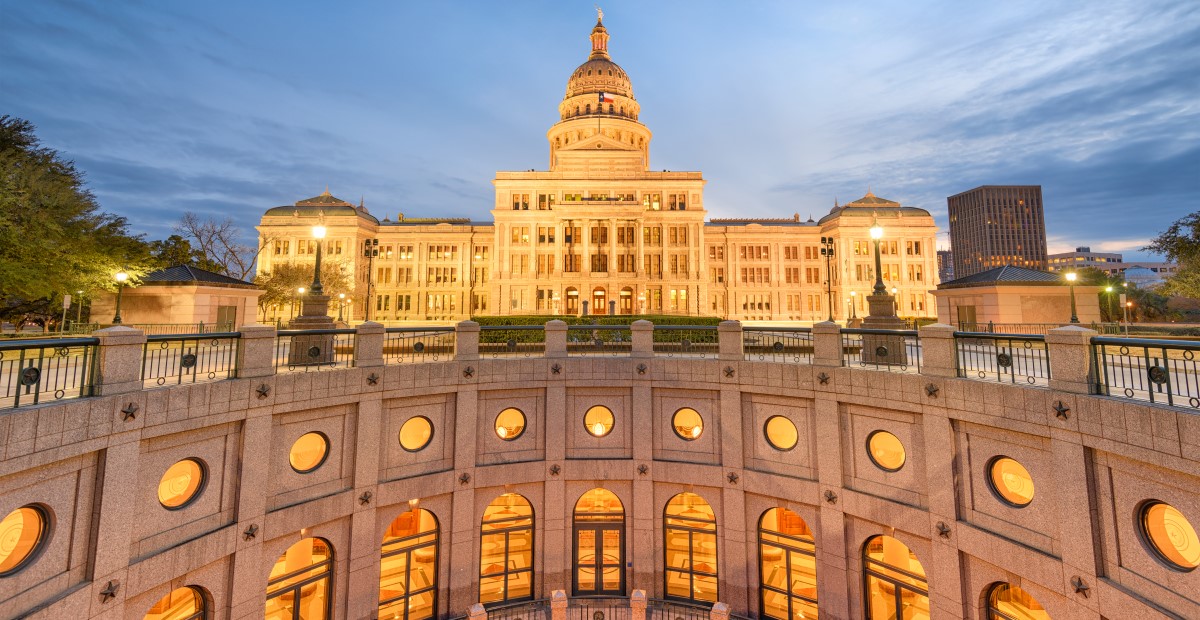Election Day is just around the corner. Here are the 14 propositions on this year's ballot.

Date Posted: 10/27/2023 | Author: Tricia Cave
Election Day is just around the corner, and while Texas is not electing any statewide officials this year, there are several important propositions on the ballot, including a proposition to provide a cost-of-living adjustment to certain Teacher Retirement System (TRS) retirees. Propositions are a chance for voters to weigh in on policy that affects all Texans, so it is critical to make a plan to vote.
Here is a quick summary of the propositions on this year’s ballot:
Proposition 1 – This proposition would protect farmers and ranchers from having their agricultural activity regulated by local governments, including within counties and cities. This proposition is meant to prevent cities from overregulating “acceptable agricultural production,” unless the regulation is necessary to protect public health, animal health, or crop production or to protect the conservation of state natural resources. Those opposed raise the concern that this limits the power of local governments, something the Legislature has done many times this session.
Proposition 2 – This proposition would exempt half of the value of a child care facility’s property from taxes. This proposition was created to protect child care centers from closure at a time when there is a shortage of child care facilities across the state. Many have shut down due to high taxes and the inability to keep employees while paying a low wage. The proposition would apply to facilities that are owned or rented and that have an enrollment of at least 20% children who receive government child care subsidies. Those opposed raise the concern that this will lower tax revenues for cities and counties while increasing the tax burden on other property owners.
Proposition 3 – This proposition prohibits the possible future creation of a wealth tax in Texas. The idea is simple: Supporters believe it is unfair to tax people for creating wealth and becoming successful. Those opposed are concerned this will limit the state’s options in the future to fund its responsibilities, such as schools, infrastructure, and public safety.
Proposition 4 – Proposition 4 would codify tax cuts that the Legislature passed in the second special session earlier this year. This proposition reduces property taxes by increasing the homestead exemption from $40,000 to $100,000; placing a cap on the value of non-homesteaded properties, such as a second home; temporarily limiting school taxes for those aged 65 and older; and term-limiting appraisal board members in counties with more than 75,000 people to four years. Supporters say this will save homeowners an average of $1,300 per year, send $12 billion from the state’s general revenue fund to school districts in order for them to lower tax rates, and benefit middle-class homeowners the most. Opponents argue the proposition gives no relief to the large population of Texans who rent, does not include any new money for underfunded schools, and could cause higher sales and business taxes.
Proposition 5 – This proposition would create research grants for Texas public universities. This is meant to help four Texas universities—Texas Tech, the University of Houston, the University of North Texas, and Texas State—receive much-needed research grants and build up Texas’ higher education system. The University of Texas and Texas A&M University, which already receive money from the Permanent University Fund, would not be eligible for these grants. Supporters of the proposition say that this will create jobs and allow our universities to compete with those in other states. Opponents are concerned that this proposition continues a culture of unequal treatment of Texas’ public universities.
Proposition 6 – Proposition 6 would create the Texas Water Fund, which is being created to address concerns about water shortages in Texas due to rapid expansion and population growth. This would be administered by the Texas Water Development Board and used to finance water projects across the state. Supporters say this will protect the availability of clean water for Texas by updating and replacing old infrastructure as the state continues to experience an explosion of new residents. Opponents are concerned that the funds provided through this proposition are not enough to address the state’s water needs.
Proposition 7 – This proposition would create the Texas Energy Fund, which would provide grants for construction and modernization of energy facilities, such as gas-fueled power plants. Renewable energy sources are excluded from receiving these funds. Many believe this proposition is necessary to build and upgrade the state’s energy supply following the 2021 winter storm. Opponents are concerned this will have a negative impact on the environment because it is available only to gas-powered plants and not those producing renewable energy.
Proposition 8 – Proposition 8 is meant to address broadband access for the growing population of Texas, especially those in rural and underserved communities. This proposition would establish the broadband infrastructure fund, providing $5 billion to expand high-speed internet access across the state. Supporters say this will lead to increased productivity and internet access for Texans living in areas not currently served by private companies. Those opposed say that internet access is not the government’s responsibility, the fund is not enough to provide for the needs of all Texans, and it does not prioritize low-income communities.
Proposition 9 – This proposition most directly affects Texas educators by providing a much-needed cost-of-living adjustment to retired teachers, starting in January 2024. Earlier this year, the Texas Legislature passed SB 10, which provided both a one-time check for retirees aged 70 and older and a cost-of-living adjustment for most retirees. This proposition, which was required due to state constitutional spending limits, would transfer $5 billion from the state’s general fund to the Teacher Retirement System of Texas (TRS). Most retired teachers have not seen a cost-of-living adjustment in 20 years. Supporters point to inflation, which has driven down the buying power of retirees, many of whom have difficulty making ends meet. Opponents say this is not enough to combat inflation. This proposition is supported by ATPE, and we encourage our members to vote to provide this important COLA to our retirees.
Proposition 10 – Proposition 10 would exempt the personal property held by a medical or biomedical manufacturer from taxes. Supporters say that this would help Texas be more competitive in the manufacturing industry and attract new businesses to the state. Opponents point out that school districts, cities, and counties would lose tax revenue.
Proposition 11 – This proposition would allow El Paso County to use property tax funds to develop and maintain its parks and recreation facilities. The proposition is necessary because local governments must get voter permission any time they ask for bond money supported by property taxes. Supporters say improved parks and recreation facilities will help to increase growth and development in the area, while opponents point to the fact that this bond will mean increased taxes.
Proposition 12 – This proposition would abolish the office of county treasurer in Galveston County. This is a move supported by current Galveston County Treasurer Hank Dougie, who campaigned on eliminating the office. This would require the Commissioners Court of Galveston County to reassign the duties of this office to other departments in the county or contract the work to private individuals or businesses. Supporters say this move would save the county $450,000 annually, allowing the county to shift those funds to other priorities. Opponents are concerned eliminating the office would remove critical checks and balances between the power of the county commissioners and the treasurer and take away accountability to voters.
Proposition 13 – This proposition would increase the mandatory retirement age for state judges and justices from 75 to 79, allowing judges who want to remain on the bench longer to do so. Supporters say this will increase the stability of the bench and point to the fact that state judges are elected and accountable to voters. Opponents are concerned about the state judicial system reflecting the demographics of the people, as well as possible health issues and cognitive decline for older judges.
Proposition 14 – This proposition would create a Centennial Parks Conservation Fund, allowing the state to build and improve on our state parks system. Supporters of this proposition point to the community benefits of expanded state park lands, including health benefits and protection of natural resources. Opponents are concerned about the use of taxpayer money to fund expanded state parks and recreation services at a time when the state has many more pressing needs to address.
Early voting in this year’s constitutional election started Monday, Oct. 23, and will end Nov. 3. Election Day is Nov. 7. It is crucial that Texas educators use their voice to weigh in on these issues, particularly Proposition 9 for our retired educators.
CONVERSATION
RECOMMENDED FOR YOU

02/06/2026
Teach the Vote’s Week in Review: Feb. 6, 2026
A special election runoff in Texas Senate (SD) 9 results in a dramatic party flip in a Republican stronghold.

02/06/2026
Congress finally unveils long-awaited education budget after another brief government shutdown
Texas schools are receiving short-term stability in key federal supports but no new fiscal capacity to address growing student needs, staffing challenges, or service mandates.

02/05/2026
How does the first round of Senate interim charges relate to public education?
Senate Finance will study lowering the homestead exemption age from 65 to 55, and Senate Education will study the influence of federal or state-designated hostile agents or their surrogates on public schools.

